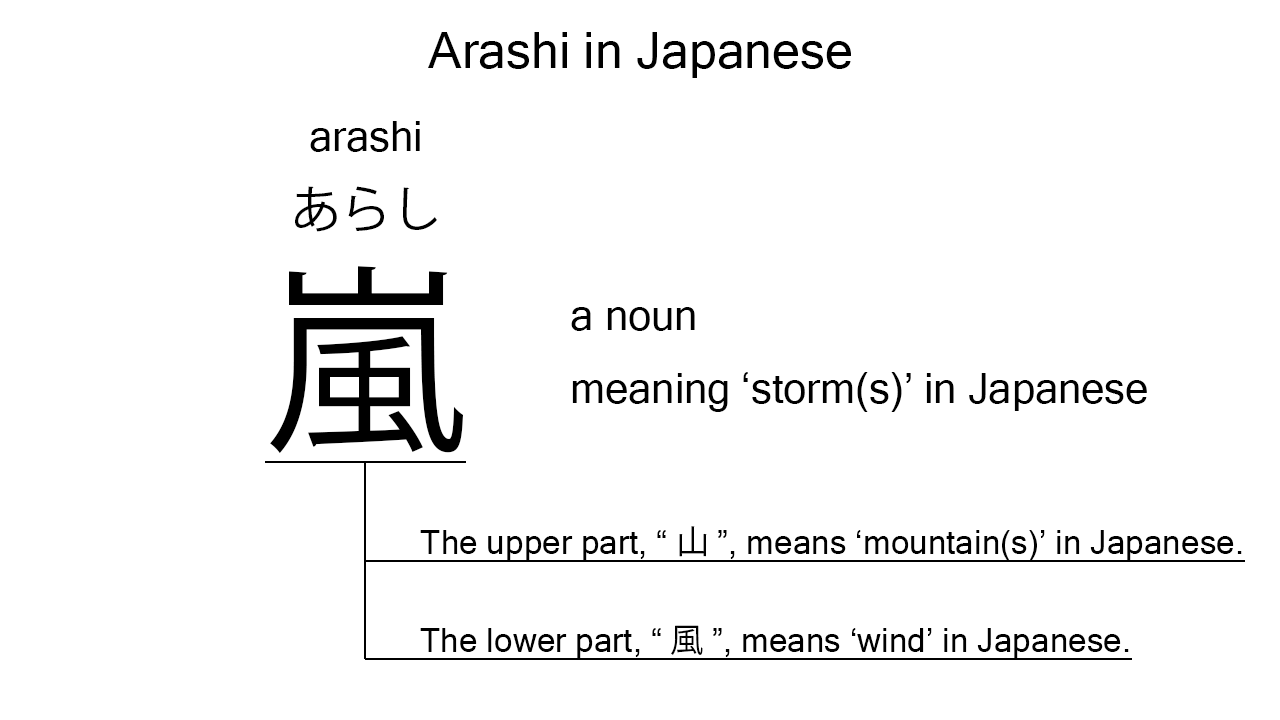What does “arashi” mean in Japanese?
There are homophones, but native speakers say “arashi” often to mean ‘storm’ in Japanese. Perhaps, some Japanese learners know this word as it is sometimes used in Japanese movies, songs, novels, manga, anime, and the like. In this blog post, however, I will explain this word in detail based on its kanji character. And also, I will explain how to use it through example sentences. My explanations would help Japanese learners understand “arashi” more clearly. Then, let’s get started!
Contents
Definition and meaning of “arashi”
Let me start with the definition and meaning of “arashi”.
- arashi – 嵐 (あらし) : a noun meaning ‘storm’ in Japanese. This can also work as plural. Learn more about Japanese plural.
The definition and meaning are simple and clear. To understand this noun more clearly, however, let me explain its kanji character in detail.
What does “arashi” literally mean in Japanese?
Below is the kanji character of “arashi”.
- 嵐 : a kanji character widely used to mean ‘storm’ in Japanese.
This kanji character consists of the following two parts:
- 山 : a kanji character used to mean ‘mountain’ in Japanese.
- 風 : a kanji character used to mean ‘wind’ in Japanese.
These two parts tell us that “arashi” literally means a ‘mountain and wind’ in Japanese. This literal interpretation is not in line with the actual meteorological phenomenon. I think, however, the kanji character worked well in the past. Storms were seemingly considered as winds from mountains in the old Japanese language.

When we meet new kanji characters, we should check their parts in detail to understand their meanings clearly and deeply. In many cases, kanji parts tell us a lot about the meanings of the characters they form. Actually, here, we could get the better understanding of “arashi” through the detailed check above.
So far, I’ve explained the definition and meaning of “arashi” together with its kanji parts. Then, let me explain how to use it through the example sentences below.
Example #1: how to say “storm” in Japanese
arashi ga chikazui te iru – 嵐が近づいている (あらしがちかづいている)
The storm is approaching.
Below are the new words used in the example sentence.
- ga – が : a case particle used to make the subject word or the object word in a sentence. In the example, this is used after “arashi” to make the subject in the sentence.
- chikazui – 近づい (ちかづい) : one conjugation of the verb, “chikazuku”, which means ‘to approach’, ‘to get close’, or such in Japanese. In the example, it has been conjugated for the better connection with its following word.
- te – て : a conjunctive particle used after a verb, adjective, or auxiliary verb to make its te form. In the example, this is used after “chikazui” to make its te form, “chikazui te”. Verbs need to be changed to their te forms to be connected with “iru”.
- iru – いる : an auxiliary verb used to express the continuity of the action described by its preceding verb. In the example, this is used after the te-formed verb, “chikazui te”, to express the continuity of its action, ‘to approach’.
This is a typical usage of “arashi”. When we want to mean a ‘storm’ in Japanese, this noun is a very good option.
Example #2: another usage of “arashi”
kotoshi wa arashi ga ōkat ta ne – 今年は嵐が多かったね (ことしはあらしがおおかったね)
This year we had many storms, didn’t we?
Below are the new words used in the example sentence.
- kotoshi – 今年 (ことし) : a noun meaning ‘this year’ in Japanese.
- wa – は : a binding particle working as a case marker or topic marker. In the example, this works as a topic marker after “kotoshi” to put a focus on it.
- ōkat – 多かっ (おおかっ) : one conjugation of the i-adjective, “ōi”, which means ‘large in number’ in Japanese. In the example, it has been conjugated for the better connection with its following word.
- ta – た : an auxiliary verb used after a verb, adjective, or auxiliary verb to make its past tense form. Probably, this is well known as a part of Japanese ta form. In the example, this is used after “ōkat” to make its past tense form, “ōkat ta”.
- ne – ね : a sentence-ending particle used to ask for agreement in a soft way. As the definition suggests, this is used at the end of the example sentence to say “didn’t we?” in Japanese.
This is another typical usage of “arashi”. In this example, it works as plural. When we want to mean ‘storms’ in Japanese, this noun is a very good option.
Summary
In this blog post, I’ve explained the definition and meaning of “arashi” in detail based on its kanji character. And also, I’ve explained how to use it through the example sentences. Let me summarize them as follows.
- arashi – 嵐 (あらし) : a noun meaning ‘storm’ in Japanese. This can also work as plural. This kanji character consists of two parts: “山” and “風”. The first one means ‘mountain’; the second means ‘wind’. So, the kanji character literally means a ‘mountain and wind’ in Japanese. This literal interpretation is not in line with the actual meteorological phenomenon. I think, however, the kanji character worked well in the past. Storms were seemingly considered as winds from mountains in the old Japanese language.
Hope my explanations are understandable and helpful for Japanese learners.
Leave a Reply